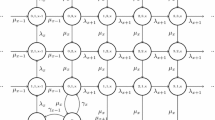Abstract
The process of finding a unit in a mobile communications system is called paging and requires the use of limited network resources. Although it is understood how to minimize the use of network resources and satisfy delay constraints when paging a single unit, optimal policies for paging multiple units are difficult to derive. Here we adapt single unit polling methods to obtain simple ensemble polling schemes for use with multiple units which can greatly increase the rate at which page requests can be processed while maintaining acceptable average delay.
Similar content being viewed by others
References
D. Goodman, P. Krishnan and B. Sugla, Minimizing queueing delays and number of messages in mobile phone location, Mobile Networks and Applications 1(1) (1996) 39–48.
D. Gross and C.M. Harris, Fundamentals of Queueing Theory (Wiley, New York, 2nd ed., 1985).
B. Hajek, The proof of a Folk theorem on queueing delay with applications to routing in networks, Journal of the Association for Computing Machinery 30(4) (October 1983) 834–851.
F.B. Hildebrand, Advanced Calculus for Applications (Prentice-Hall, Englewood Cliffs, NJ, 2nd ed., 1976).
L. Kleinrock, Queueing Systems, Vol. 1 (Wiley-Interscience, 1975).
S. Madhavapeddy, K. Basu and A. Roberts, Adaptive paging algorithms for cellular systems, in: 5th Winlab Workshop on Third Generation Wireless Information Networks, New Brunswick, NJ (April 1995).
A. Papoulis, Probability, Random Variables, and Stochastic Processes (McGraw-Hill, New York, 3rd ed., 1991).
S. Tabbane, An alternative strategy for location tracking, IEEE JSAC 13(5) (June 1995) 880–892.
C. Rose, A greedy method of state-based registration, ICC 96, Dallas (June 1996) pp. 1158–1162. Also submitted to IEEE Transactions on Vehicular Technology.
C. Rose, Minimization of paging and registration costs through registration deadlines, in: Proceedings of IEEE/ICC 95, Seattle (1995) pp. 735–739.
C. Rose, Minimizing the average cost of paging and registration: A timer-based method, Wireless Networks 2(2) (1996) 109–116.
C. Rose and R. Yates, Minimizing the average cost of paging under delay constraints, Wireless Networks 1(2) (1995) 211–219.
S.M. Ross, Stochastic Processes (Wiley, New York, 1983).
G.F. Simmons, Differential Equations with Applications and Historical Notes (McGraw-Hill, 1972).
H.C. Tijms, Stochastic Modeling and Analysis: A Computational Approach (Wiley, Chichester, 1986)
R. Yates, C. Rose, S. Rajagopalan and B. Badrinath, Analysis of a mobile-assisted adaptive location management strategy, Mobile Networks and Applications 1(2) (1996) 105–112.
Author information
Authors and Affiliations
Rights and permissions
About this article
Cite this article
Rose, C., Yates, R. Ensemble polling strategies for increased paging capacity in mobile communication networks. Wireless Networks 3, 159–167 (1997). https://doi.org/10.1023/A:1019196931796
Issue Date:
DOI: https://doi.org/10.1023/A:1019196931796



